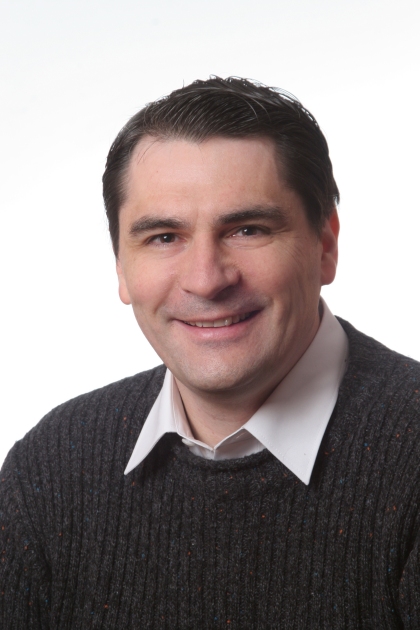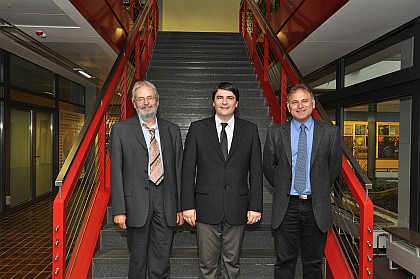
|
Press Release 12/2011
|
 |

|
Press Release 12/2011
|
 |
Press Release 12/2011 - Mai 20, 2011
Yesterday a short ceremony at the Max Planck Institute for Solar System Research (MPS) in Katlenburg-Lindau (Germany) was held to celebrate the inauguration of a new director, Prof. Laurent Gizon. The French scientist is recognized as one of the leading researchers in the field of helioseismology, which uses space observations of solar oscillations to infer processes within the Sun and image these in three dimensions. The MPS now encompasses three scientific departments.
"This inauguration is a special event for the entire institute", says Prof. Ulrich Christensen, Managing Director of the MPS. "The addition of a third department reaffirms MPS's position at the forefront of solar system research".

|
|
Figure 1: Prof. Laurent Gizon is a new director at the Max Planck Institute for Solar System Research. |
|
(Credits: MPS/Fotostube Hornig) |
Prof. Gizon is no stranger to the MPS: in 2005 he established a Max Planck Research Group at MPS. Now his group will develop into a full department. In addition, he has been appointed full professor of physics at the University in Göttingen, which will foster collaborations in the future, especially in the context of the move of MPS from Katlenburg-Lindau to Göttingen in 2014.
Gizon's research focuses on the physical connections between internal solar properties and the magnetic activity observed at the solar surface. This will help us understand how the Sun generates its magnetic field and affects the Earth. Using helioseismology he has already characterized the subsurface structure of sunspots, dark regions of very strong magnetic field. In addition, he pioneered the use of asteroseismology (the seismic investigation of distant stars) to measure the internal rotation rate, a fundamental property of all magnetic stars.
The new department is already involved in important international space missions. Gizon's team actively participates in the scientific analysis of observations from NASA's Solar Dynamics Observatory, the most important helioseismology mission of this decade. In addition, Gizon contributes to the scientific definition of the Solar Orbiter mission of the European Space Agency (ESA) that will study the Sun's polar regions from 2017. He is also a leading member of the European consortium that proposes PLATO as a future ESA mission to detect planets beyond our solar system. With PLATO, methods of asteroseismology will be essential for characterizing the planets through their host stars.

|
|
Figure 2: Prof. Ulrich Christensen (MPS Managing Director), the new director Prof. Dr. Laurent Gizon and Prof. Dr. Sami K. Solanki (MPS Director). |
|
(Image: MPS) |
Laurent Gizon studied aerospace engineering at the École nationale supérieure de l'aéronautique et de l'espace in Toulouse and received a PhD in physics from Stanford University in California in 2003. He joined the MPS in 2005 as a Max Planck Research Group Leader. In 2008 he obtained one of the highly contested Starting Grants of the European Research Council and was awarded the 2009 Karen Harvey Prize of the American Astrophysical Society for his significant contributions to the development of helioseismology techniques for the study of the Sun's internal dynamics.
Since 1955 the Max Planck Institute for Solar System Research has been located in Katlenburg-Lindau (Germany) - formerly under other names. The institute consists of the three scientific departments "Planets and comets", "Sun and heliosphere", and, now, ![]() Physics of the interior of the Sun and Sun-like stars. The MPS has contributed to many international space missions such as NASA's Phoenix mission to Mars and the highly-successful ESA/NASA Solar and Heliospheric Observatory (SoHO). Some of the most challenging projects that will involve the MPS in the years to come include NASA's asteroid mission Dawn and the landing of ESA's spacecraft Rosetta on a comet.
Physics of the interior of the Sun and Sun-like stars. The MPS has contributed to many international space missions such as NASA's Phoenix mission to Mars and the highly-successful ESA/NASA Solar and Heliospheric Observatory (SoHO). Some of the most challenging projects that will involve the MPS in the years to come include NASA's asteroid mission Dawn and the landing of ESA's spacecraft Rosetta on a comet.
Dr. Birgit Krummheuer
Press and Public Relations
Max Planck Institute for Solar System Research
Max-Planck-Straße 2
37191 Katlenburg-Lindau
Tel.: 05556 979 462
Fax: 05556 979 240
Mobil: 0173 3958625
Email: krummheuer![]() mps.mpg.de
mps.mpg.de
| © 2009, Max Planck Institute for Solar System Research, Lindau |
Presseinfo 20-05-2011 |